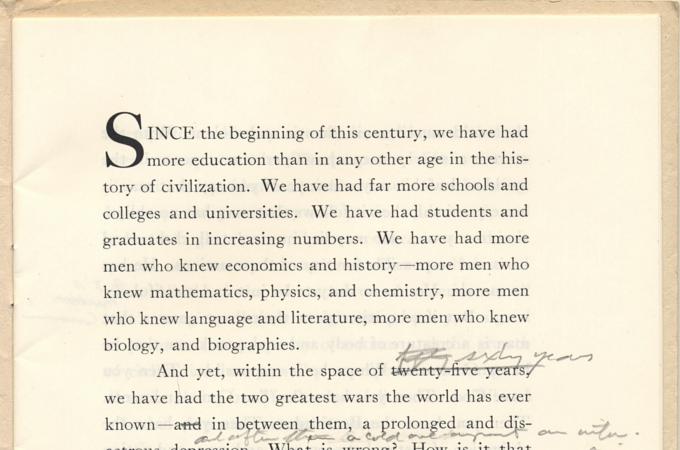Cardinal Cushing reflects on limits of knowledge
On June 15, 1944, Cardinal Richard J. Cushing spoke to the graduating class of Boston College, offering his reflections upon the education system and what he saw as its inadequacies.
His commencement address opens by acknowledging that "since the beginning of this century, we have had more education that in any other age in the history of civilization." He justifies this claim by pointing out the ever growing number of schools, universities, students and graduates. Similarly, he acknowledges the breadth of knowledge which had been cultivated under these circumstances, mentioning the increasing number of scholars with knowledge of economics, history, mathematics, physics, and other subject areas.
He then approaches the theme of his address, explaining that our education system had reached its present state, "and yet, within the space of 25 years, we have had the two greatest wars the world has ever known -- and in between them, a prolonged and disastrous depression. What is wrong?"
What was wrong, he claimed, was that scholars could now answer many questions, but "ignored the basic question or failed to give the correct answer to the great fundamental question: 'What is Man?"
Without an answer to this question, he continues, world peace will never be achieved. For instance, if man is animal, than he is not beholden to any one, any system, and may do as he wants. Scholars strive to provide answers to many questions, but do so through thorough scientific examination, which does not leave a place for the unexplained -- faith.
He elaborates further, observing that there is little collaboration between fields of study, with each focusing on their own area. But this prevents understanding "history as a whole, or life as a whole or even man as a whole." He goes on to deliver his most polarizing statement, revealing his belief that all that has come from this progress was being used to bring about mankind's ruin.
I thought it appropriate to highlight this document as we approach the close of the college commencement season, and next Monday, June 6, which marks the anniversary of the allied invasion of Normandy. Cardinal Cushing delivered this address nine days after the landings, and the influence of those events upon this document are clearly visible.
By this point, the war had already been raging for nearly five years, with United States involvement approaching its third year. While allied leaders had already begun planning for peace, it is evident that others were still fixated on how the world had devolved into war.



















